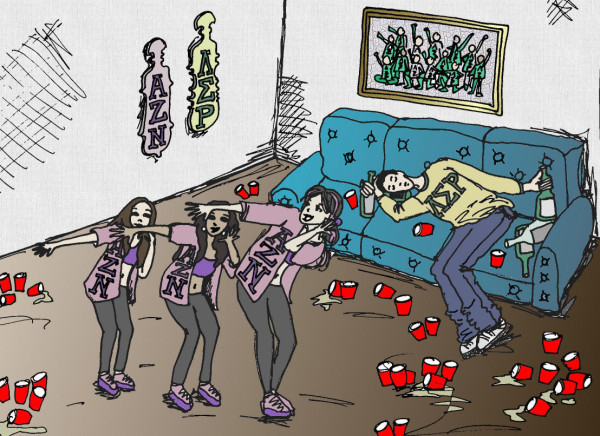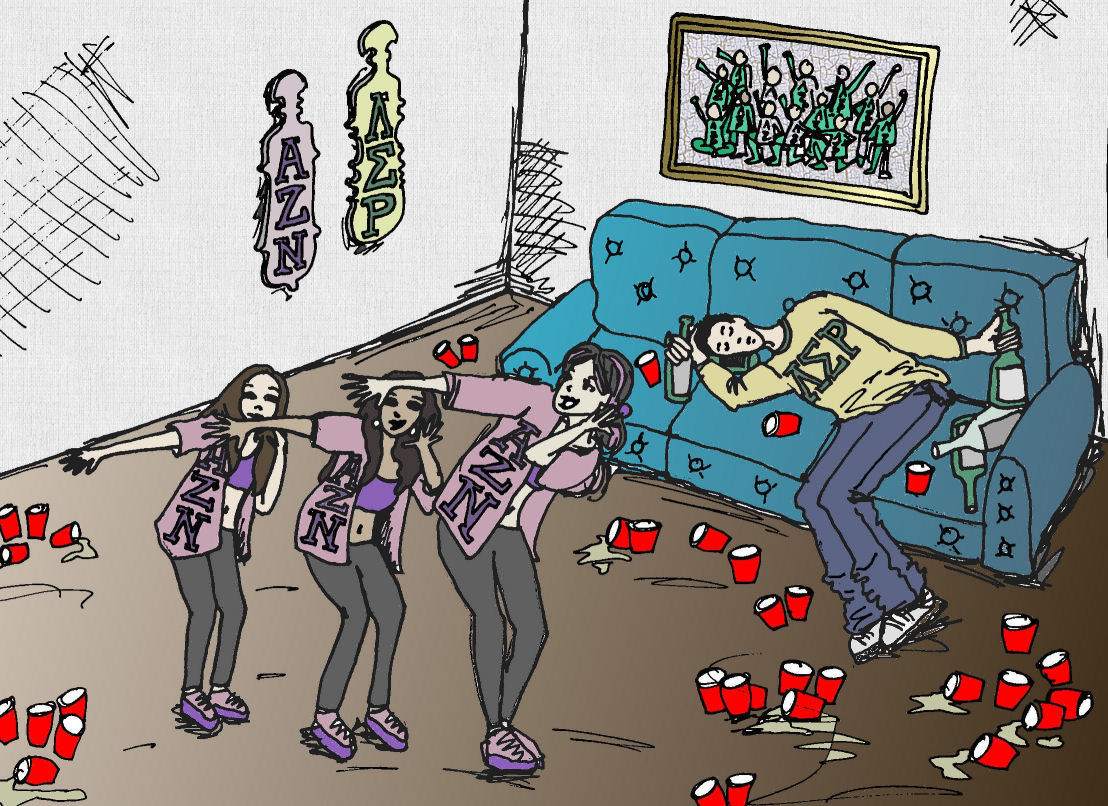
The first Asian American fraternity was formed in upstate New York around the time of World War I to combat the racial discrimination that Asian college students faced. Basically, because Asians were excluded from the white people’s clubs, the guys decided to form their own. In the late 40s, a group of Japanese American women in Southern California formed the first Asian American sorority to support one another in the face of anti-Japanese sentiments and racism.
After the murder of Vincent Chin in the 80s, Asian American fraternities and sororities were at the helm of college-level coalitions pushing for federal prosecution of the perpetrators. They organized vigils, raised money, passed out pamphlets to inform people of what happened, back before the days of YouTube, Facebook, and blogs, and led protests.
By the 90s, the idea of starting your own cultural interest Greek (“Asian Greek”) went viral and today there’s a gazillion of them. In the 90s, Asian Greeks led the charge on many campus political fronts. They had the clout to round up crowds of Asian Americans to rally for change. Many of those fraternity brothers and sorority sisters were activists. They challenged white-dominant student associations when minority interests were subjugated. I recall one incident during my stint in college where this happened and the Asian Greeks united in a positive and uplifting way that did bring about change.
So where are the Asian Greeks today?
Are they the superheroes that the Asian community turns to when shit gets racist? Heck no. The Asian Greek voice has been silent in the wake of the last decade’s eyelid pulling, Asian-men-shoot-up-schools stereotyping, racist receipts, abysmal APIA voter turnout, and the other daunting social and civil issues Asian Americans face in 2013. I do not deny that individuals who happen to be affiliated with an Asian fraternity or sorority have contributed, but there has been no national scale mobilization, which these organizations are highly capable of if they’d only give a damn. Re-imaging popular (effeminate) conceptions of Asian masculinity is still unfinished business for APIA activists and I would think Asian fraternities would feel a personal stake in doing more to be positive public Asian male role models.
If asking 20-somethings to be superheroes is a tall order (and it is not, because social change has always begun with the 20-somethings who were brave enough to stand up and protest), then what about simply upholding their organization’s own stated purpose–fostering brotherhood or sisterhood. Here’s the reality: every one of the Asian Greeks is battling with internal strife, scandal, gossip, backstabbing, and cliques within the cliques that inevitably exclude one sorry individual who then retaliates and the cycle of internal strife, scandal, gossip, and backstabbing perpetuates itself. While that may not be unique to Asian Greeks, it does call into question what the purpose is for institutionalizing a racial distinction of brotherhood when the tenets of brotherhood can’t even be maintained.
Now what is unique to Asian Greeks: a weak alumni/alumnae support network. The discrepancy becomes apparent among the Greek alums in my age range. Most non-Asian Greek organizations have members who are still actively involved up to their sixties. Those who live near a university where a chapter of the organization is established will still fund-raise for the undergraduate chapter. These alums serve as mentors and are still involved with the organization on day-to-day operations. The national board of directors of these organizations are, well, old, because the organization succeeds at keeping the old ones caring, whereas in Asian Greeks, the national board of directors are seated with more 20-somethings who haven’t one clue what they’re doing. They simply don’t have the life experience to steer a national brotherhood or sisterhood.
It is a constant struggle among Asian Greeks to keep their alums caring. Granted, many of the non-Asian Greeks we’re talking about were formed in the 1800s while most Asian Greeks have only a few decades on them, but that itself does not explain the impotency of Asian Greeks today. The worst part of all: the most professionally successful members of the Asian Greeks end up resenting the organizations and not only have no interest in giving back to their organization, but don’t even want to disclose their affiliation with Asian Greeks. More than anyone, these are the alums who need to return and guide the Asian Greeks.
When was the last time you heard a positive news story about Asian Greeks? Notwithstanding mainstream media, independent grassroots and community-based outlets can’t even find a positive spin on the ongoings of Asian Greeks today. Instead, we get stories about alcohol-fueled pledging activities gone fatally awry, dozens of them, drunk driving that leads to one fraternity brother accused of involuntary manslaughter of a fellow brother, and of course the recent fiasco of Asian Greeks in blackface and posting videos of it on the Internet.
Then when a white fraternity at Duke threw a racist Asian themed party, where were the Asian Greeks? Several of them exist on that campus. Yet it was the Student Association and a multicultural collective of activists who called foul. The Asian fraternities and sororities didn’t lead. Heck, did they even follow? I would expect the Asian Greeks to be the loudest voice of protest, but they weren’t. And when bills are presented to the highest echelons of our government that will directly affect Asian Americans, where are the Asian Greeks to be leaders and inform the rest of their community about it?
What about Ms. Wallace’s “Asians in the Library” rant? Asian Greeks could have gotten together to collaborate on creative responses to Ms. Wallace’s rant. They could have issued public statements against it. They could have done something to show that they’re aware of continued racism against Asian Americans and are actively taking a stand against it. Where were the Asian Greeks then? Considering the exorbitant amount of time pledges are required to spend at the campus library, I’m sure Ms. Wallace’s hostility against Asians included the Asian Greeks. Earlier this month President Obama acknowledged the surging hate crimes against South Asians. There is a significant percentage of South Asians in these organizations, so are the Asian Greeks doing their part in any way? Are they being leaders for our community?
Perhaps most tragic of all, where was the Asian Greek advocacy when Pvt. Danny Chen was brutally harassed and beaten for being Chinese American, and subsequently shot to death? When a hate crime is perpetrated against a member of our community, I absolutely expect the Asian Greeks to be loud about it. James Malecek, a Korean adoptee, and his younger sister, also a Korean adoptee, were at a July Fourth event, to which his sister wore the colors red, white, and blue. A couple of white dudes told the sister that she shouldn’t be wearing American colors because she isn’t really American. They harassed her and in defense of his little sister, James Malecek went to town on the guys with his fists. One of them died by fluke and Malecek was convicted of manslaughter. Couldn’t our organizations have raised funds for Malecek’s legal defense fees? Could we have made some public expression to simply let Malecek know we had his back? These are social and cultural organizations, not to mention activism and civil rights advocacy are their legacy. Today, these Asian Greeks take their social aspect seriously but not their other roles. Then the few times we do get to hear about them in the news, it’s always a WTF.
I do not write this to condemn Asian Greeks. I write this to critique them. There needs to be an active engagement in the politics and social issues that involve Asian Americans. These fraternities and sororities are in the best position to mobilize on a large scale in response to iniquities and offenses against Asians. There are many baby steps these organizations could do to foster activism in their future generations:
- Pledges need to stand up publicly against an incident or condition that denigrates Asian Americans. Screw poorly written essays in pledge books. Make them do something public. Teach them about protest and advocacy. Make them use their voice. Pledging is about character building. Use the opportunity to build their characters.
- Establish a top down system where an officer at the national executive level can issue orders to mobilize all chapters of the organization when duty and moral obligation as an Asian American leader calls for it. All you organizations, after all, claim to be leaders in your community. Right?
- Instead of channeling all of your focus on getting a banner of your Greek letters hung up at this year’s China Night, Korea Night, Asian Night, or whatever, channel some of that focus on how to get your Greek letters in the news associated with positive action. I am totally in favor of shameless self promotion, but while you’re at it, why not try to do some public good? Promote your letters in conjunction with a public statement that takes a stand against a racist act or hate crime. Recruit the most talented members of your organization to produce quality social media and again, go ahead and make sure the public knows that it’s coming from your organization.
- Consider appointing someone in your organization as a publicist or public image strategist who will help with positive PR for your organization, showing the public how your organization is actively upholding its mission and purpose. Since we are still an ethnic minority, you as a public figure represent the community, for better or for worse, whether you want to or not. So positive promotion of your letters is in fact positive promotion for all of us.
Asian Greeks must change if they want to remain relevant today. It isn’t enough to put on meaningless “cultural workshops.” It isn’t enough to wake up Saturday morning for a walk that half your organization doesn’t even have a vested interest in. Instead of promoting your own letters with gaudy felt banners, promote the Asian American community at large. Do that by being a public figure. Let your organization’s voice be heard loud and clear when shit gets racist.
Be the leaders among men you say you are. Educate the community about Pan-Asian culture as you claim as your mission. If you don’t do that, then there is absolutely no reason for the existence of Asian Greeks today, especially considering how they bring more negative press to our community than they do positive.







